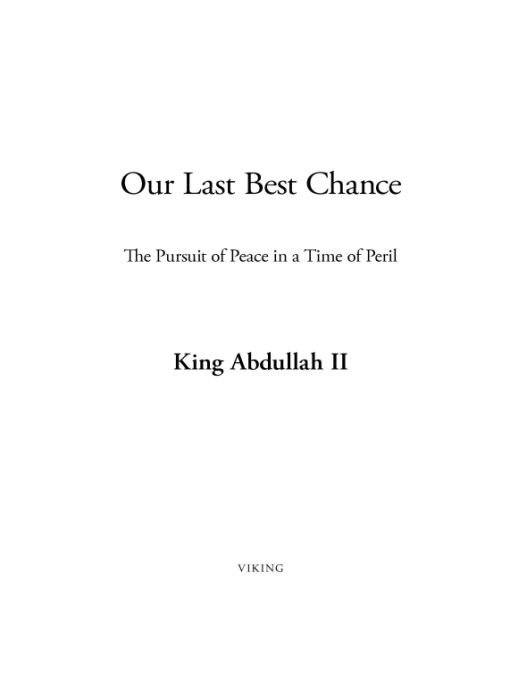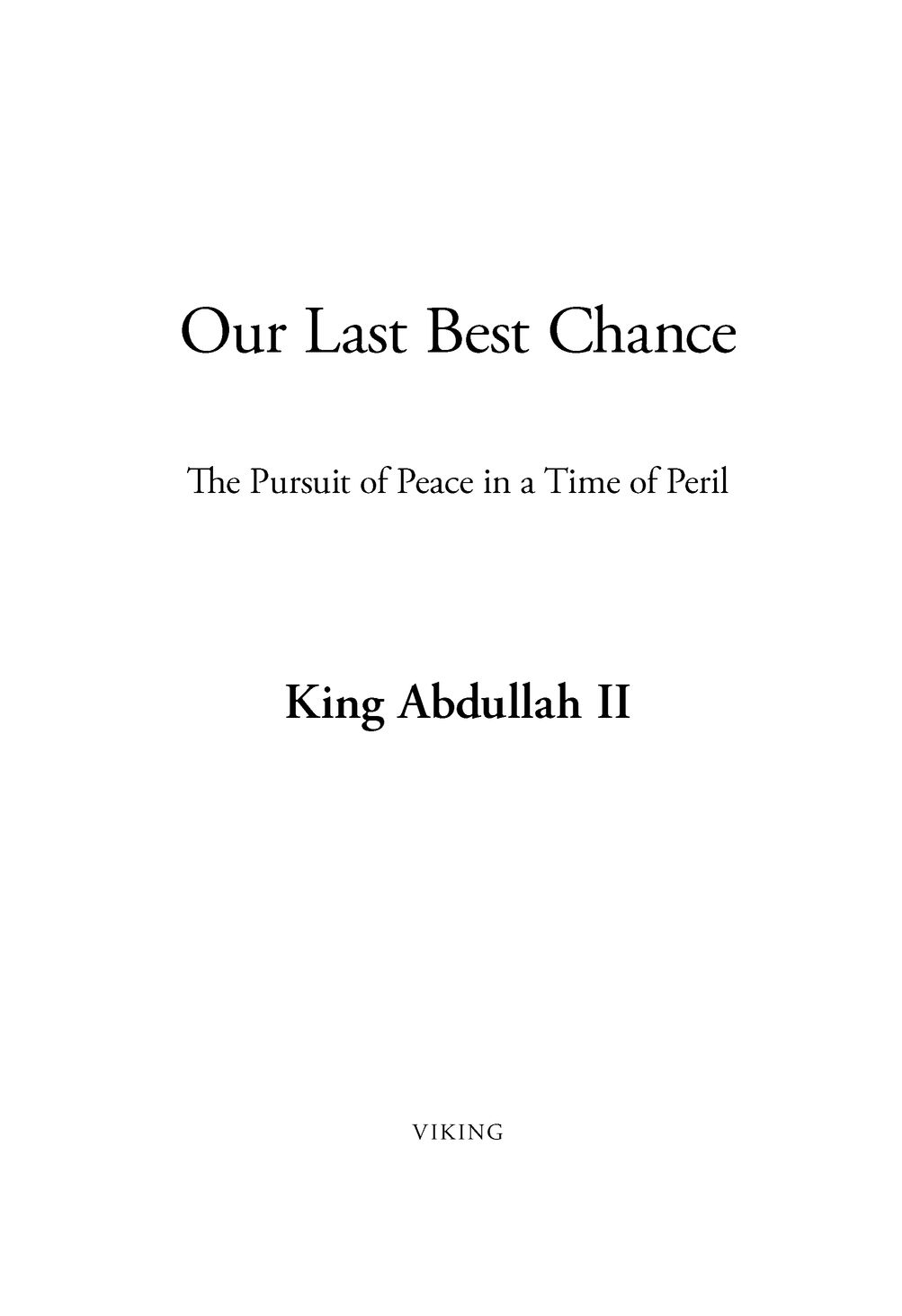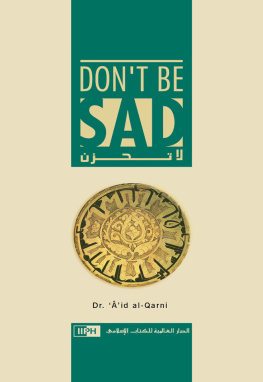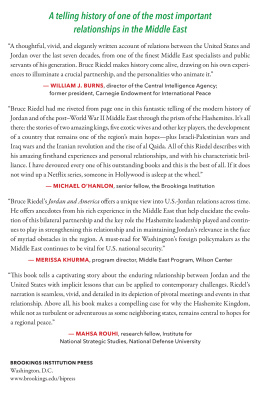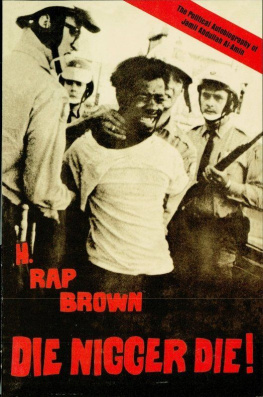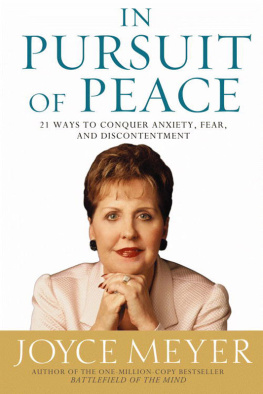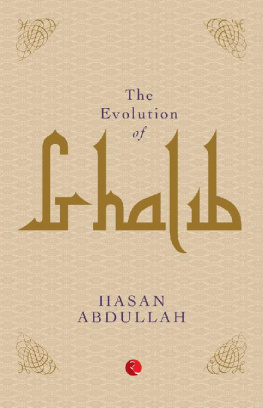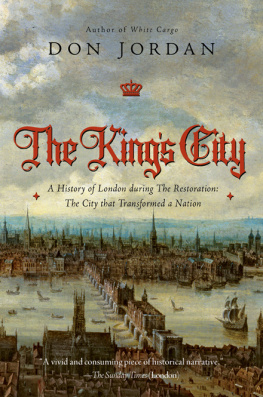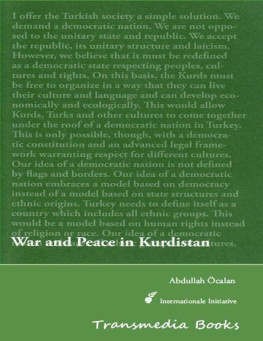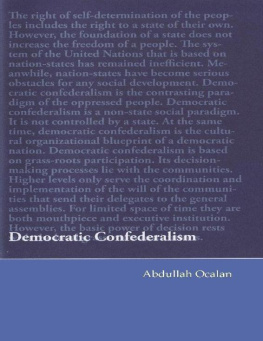Table of Contents
THIS BOOK IS FOR THE PEOPLE OF JORDAN.
PREFACE
Two years ago, when I started writing this book, I hoped it would reveal the inner workings of how, against great odds, the United States, Israel, and the Arab and Muslim world had brokered peace in the Middle East. As I write these words, however, I can only say that this is a story about how peace has continued to elude our grasp. And yet, in my region, where optimism is even more precious than water, we cannot afford to give up hope.
Why would a head of state want to write a book? There are countless reasons why doing so may be ill-advised. Running a country, after all, even a small one, is a full-time job. Added to that is the requirement of getting along with neighborsmany of whom could easily be offended by an honest presentation of the facts as viewed from another nations perspective. And then there are those who will want their actions either to go unmentioned or to be praised beyond their worth.
I have decided to put aside these arguments and write this book because the Middle East, the very tough neighborhood in which I live, is facing a moment of real crisis. I believe we still have one last chance to achieve peace. But the window is rapidly closing. If we do not seize the opportunity presented by the now almost unanimous international consensus on the solution, I am certain we will see another war in our regionmost likely worse than those that have gone before and with more disastrous consequences.
People around here have long memories. They readily remember previous failed attempts to bring together the parties to the conflict. Many of the same players are still on the stage, and likely will remain so for years to come. This could be seen as a compelling reason not to speak publicly about sensitive issues, but I believe the world must know the risks of doing nothing.
My fathers generation reeled from the blast of war about once a decade. Following the war triggered by the creation of Israel in 1948, there was Suez in 1956, the disastrous 1967 war, when Israel seized the West Bank, the Sinai, and the Golan Heights, and the war of 1973, when Egypt and Syria tried and failed to win back the territory they had lost in 1967. These were followed by the Iran-Iraq War and the Israeli invasion of Lebanon in the 1980s, and the Gulf War in 1991. The periods in between could be called peace only in the loosest of senses. In the eleven years since I became King of Jordan, I have seen five conflicts: the Al Aqsa intifada in 2000, the U.S. invasion of Afghanistan in 2001, the U.S. invasion of Iraq in 2003, the Israeli invasion of Lebanon in 2006, and the Israeli attack on Gaza in 2008-9. Every two or three years, it seems, another conflict besets our troubled region. As I look forward, my greatest fear is that we will soon see another war between Israel and its neighbors, triggered by a yet unknown flashpoint, that will escalate in terrifying ways.
The conflict between the Israelis and the Palestinians goes back to the early years of the twentieth century, but the impact of their struggle is felt very much in the present. Since the breakdown of the peace process in 2000, about a thousand Israelis and over sixty-five hundred Palestinians have been killed, and many thousands more injured. Today the whole Middle East faces the critical challenge of resolving a conflict that has almost defined the modern history of the region. If we succeed, I believe we will strike at one of the main roots of violence and instability in the Middle East.
Many in the West, when they look at our region, view it as a series of separate challenges: Iranian expansionism, radical terrorism, sectarian tensions in Iraq and Lebanon, and a long-festering conflict between Israel and the Palestinians. But the truth is that all of these are interconnected. The thread that links them is the Israeli-Palestinian conflict.
For Muslims, the Arab-Israeli conflict is qualitatively different from any other in which they are involved. Contrary to what some like to say, it is not a religious struggle. It is a political conflict over rights and land. In 1900 there were around 60,000 Jews and 510,000 Arabs in the land of historic Palestine. Following a century of mass immigration, there are now over 6 million Jews and only 5 million Arabs. Many Jewish immigrants came during the persecution by the Nazi regime that culminated in one of the greatest tragedies in historythe Holocaust. Many more came later, when Israel opened its doors to Jews from all over the world. The 1948 war resulted in the displacement of hundreds of thousands of Palestinians, most of whom have never been allowed to return to their homes. The 1967 war put many moreespecially those living in the West Bank, which had been part of Jordanunder Israeli occupation. Millions of Palestinians live today under Israeli occupation, and Israeli actions are threatening the identity of Jerusalem, one of three holy cities in Islam. The importance of Jerusalem in part explains the centrality of the Palestinian issue to Arabs and Muslims the world over.
A point not well understood in the West is that this is a global issue. When I go to Indonesia or China and meet with Muslims, they want to talk about Jerusalem. When I went to New Delhi in 2006 and met with the Muslim community of India, I was asked: When are the Arabs going to solve the Israeli-Palestinian problem? When Pakistanis list their grievances, right after India comes Israel. The Palestinian issue is a cause that resonates among all the worlds 1.5 billion Muslims.
This explains (but does not justify) why radical groups like Al Qaeda, claiming to want to liberate Jerusalem, can manipulate the cause and draw others to commit acts of terrorism in the name of defending Islam and the Palestinians. It also explains why groups like Hezbollah and Hamas, although very different from Al Qaeda in mandate and ideology, arm themselves against Israel, and why calls for resistance are embraced by a growing number of Arabs and Muslims. This call for armed struggle against the occupation gains more credibility as efforts by Arab countries like Jordan, Egypt, and the Kingdom of Saudi Arabia to achieve a negotiated peace fail to deliver.
But if Israel could make peace with the Palestinians, then what moral justification would any government or resistance group have for continuing the struggle? If Jerusalem were a shared city, with East Jerusalem as the capital of a viable, sovereign, and independent Palestinian state, what possible rationale could the government of Iran, for example, have for its anti-Israeli rhetoric and actions?
One of the best weapons against violent extremists is to undercut their rallying cries. Solving the Muslim worlds most emotional problem by establishing a Palestinian state based on the pre-1967 boundaries, with East Jerusalem as its capital, would help remove one of the biggest reasons for conflict in the Muslim world. Achieving a just and lasting peace is one of our most powerful tools against extremism. It wont stop every fanatic, but it will radically transform the playing field. As such, it should be an American priority as well as an Arab one.
Another often misunderstood aspect of the conflict is its impact on the Christian community and holy sites in Jerusalem. Before the 1967 war, Jordan administered the West Bank, including East Jerusalem, and it remains the legal and political guardian of all the holy sites in the Old City, Christian and Muslim alike. So when Israelis attempt to consolidate their illegal occupation of East Jerusalem by building more settlements, Jordan is a staunch defender of the rights of the Christian and Muslim communities. Today there are only about eight thousand Christians left in Jerusalem, compared to some thirty thousand in 1945. Israeli policies and social and economic pressures have forced the majority of Christians to leave. Most native Christians in Jerusalem are Arabs, and while Israel welcomes foreign Christians who come to visit Jerusalem, it makes life very difficult for Christian Jerusalemites. This is ironic, since the Arab Christian community is the oldest Christian community in the world, and its presence in Jerusalem dates back to the time of Jesus Christ. Palestinian Christians and Palestinian Muslims have suffered equally under the occupation, and they share the same aspirations for freedom and the Kingdom of statehood.

